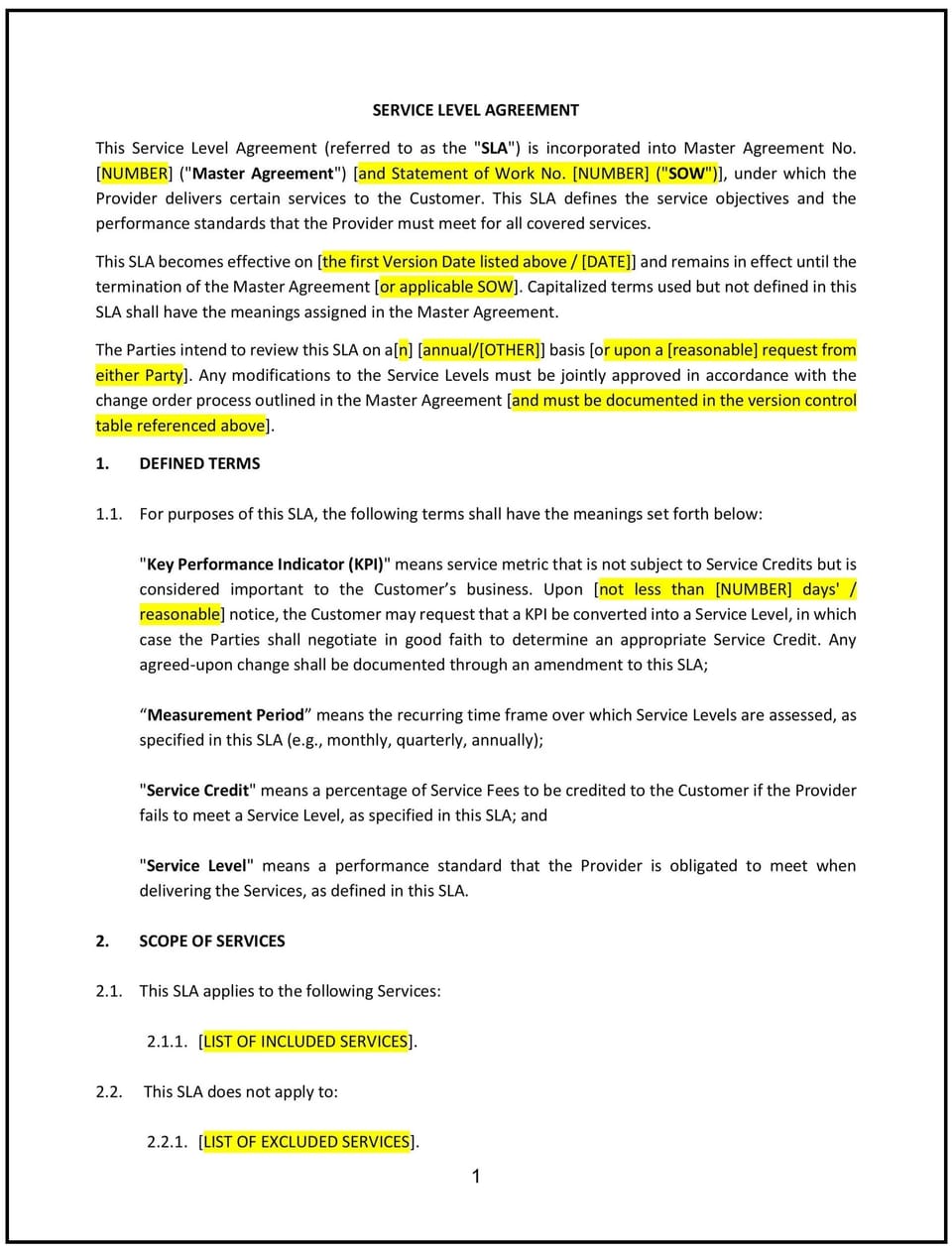Service Level Agreement (SLA) (North Carolina): Free template

Service Level Agreement (SLA) (North Carolina)
A Service Level Agreement (SLA) in North Carolina is a legally binding contract that establishes the service standards, performance expectations, and responsibilities between a service provider and a client. This agreement is critical for businesses that depend on external service providers for essential operations, such as IT services, cloud computing, managed services, consulting, and maintenance contracts. A well-structured SLA ensures that services meet expected levels, protects businesses from underperformance, and provides a clear course of action if service commitments are not met.
In North Carolina, SLAs are governed by general contract law principles. While there are no state-specific SLA regulations, businesses in regulated industries such as healthcare, finance, and telecommunications must comply with federal and industry-specific laws. Having a properly structured SLA is essential for small and mid-sized businesses that may not have in-house legal teams to manage contract enforcement. It helps prevent costly disputes, ensures service reliability, and protects business operations.
Tips for drafting and maintaining a Service Level Agreement in North Carolina
- Clearly define the scope of services, including specific deliverables, response times, and limitations. Unclear agreements can lead to disputes over what was promised versus what was delivered.
- Establish measurable performance metrics, such as uptime percentages, resolution times for technical issues, and support response times. These metrics help ensure service accountability.
- Outline the client’s responsibilities, such as providing necessary access, data, or system permissions required for the provider to meet service obligations. This helps prevent delays caused by missing client-side resources.
- Specify remedies for service failures, such as service credits, discounts, refunds, or contract termination rights if the provider does not meet performance commitments. North Carolina businesses can negotiate these terms freely.
- Include a dispute resolution process, detailing whether disagreements will be handled through North Carolina courts, mediation, or arbitration. Many businesses prefer arbitration as a faster and more cost-effective alternative to litigation.
- Address confidentiality and data security obligations, particularly if the provider handles sensitive business or customer information. North Carolina businesses should ensure they comply with applicable federal data privacy laws.
- Regularly review and update the SLA to keep it aligned with business needs, technological advancements, and regulatory changes. A static SLA can become outdated and ineffective over time.
Frequently asked questions (FAQs)
Q: What should North Carolina businesses include in a Service Level Agreement?
A: The agreement should include a clear service description, performance expectations, remedies for underperformance, client responsibilities, dispute resolution terms, and termination rights.
Q: How does an SLA benefit small and mid-sized businesses in North Carolina?
A: It provides a structured way to ensure service providers meet commitments, protects businesses from poor service, prevents costly disputes, and ensures operational reliability.
Q: Are service credits enforceable in North Carolina SLAs?
A: Yes, as long as they are explicitly defined in the contract, service credits (such as discounts or refunds for unmet service levels) are legally enforceable.
Q: What happens if a service provider fails to meet SLA requirements in North Carolina?
A: Depending on the agreement, the client may receive service credits, refunds, or the right to terminate the contract. In severe cases, legal action may be taken.
Q: How should North Carolina businesses handle SLA disputes?
A: The SLA should specify how disputes will be resolved, such as through negotiation, mediation, arbitration, or litigation in North Carolina courts.
Q: Are verbal SLAs enforceable in North Carolina?
A: While verbal agreements may sometimes be legally binding, a written SLA offers significantly stronger legal protection and reduces the risk of misunderstandings.
Q: Can an SLA be modified after signing in North Carolina?
A: Yes, but both parties must agree to the changes, and any modifications should be documented in writing to prevent future disputes.
This article contains general legal information and does not contain legal advice. Cobrief is not a law firm or a substitute for an attorney or law firm. The law is complex and changes often. For legal advice, please ask a lawyer.


